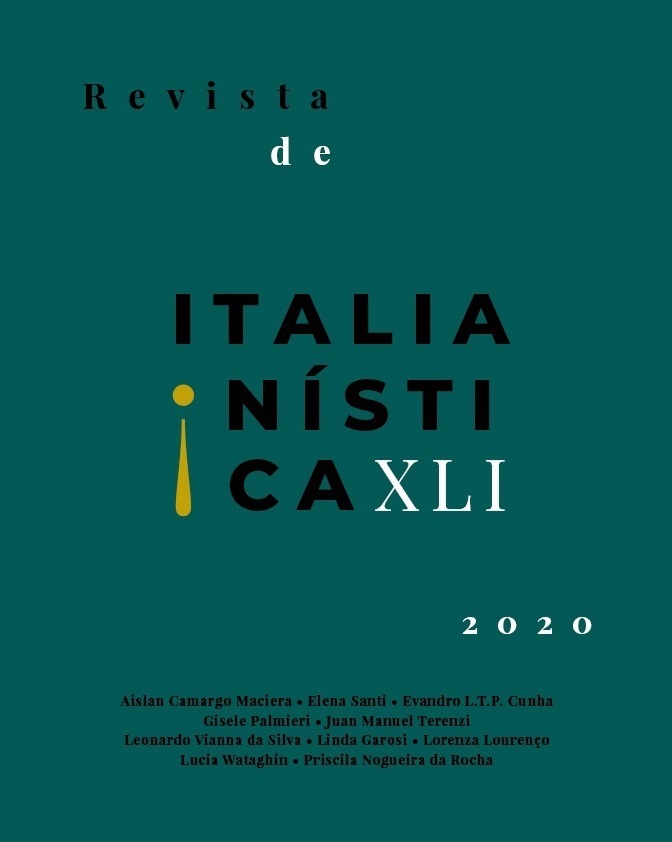LEONARDO SCIASCIA AND THE UNPRONUNCEABLE TRUTH
DOI:
https://doi.org/10.11606/issn.2238-8281.i41p69-83Keywords:
Sicily, Mafia, OmertàAbstract
This study investigates the considerations from the Sicilian author Leonardo Sciascia regarding omertà, the “law of silence.” From its inception, the practice has been linked to the modus operandi of malavita in meridional Italy, although it is also considered a cultural standard in Sicilian society. We found criticism to omertà both on the author’s essays and in some of his novels, such as Il giorno della civetta (1961), A ciascuno il suo (1967) e Il contesto (1971). These criticism, which is presented latently in the literary texts , may indicate that this social convention was a relevant concern to Sciascia, despite rarely being addressed in studies about his work. The subtle focus on his oeuvre on this silence involving the mafia appears to have been diverted away. It is believed to be due to the intellectual being regarded as the first to narrate mafia in literature in a non-folkloric way, and the absence of any mention to the word omertà in his novels. To Sciascia, the practice of omertà, in addition to serving as a means to ensure that the mafia will enjoy impunity, also places Sicilians as mafia defenders, which is an uncomfortable position. Thus, we consider the silence about mafia (as opposed to the silence of mafia) to be the writer’s most significant accusation of Sicilian society.
Downloads
References
BALDWIN, T. Leonardo Sciascia: l’uomo il citadino e lo scrittore. Lo Stato delle Cose: Pensiero Critico & Scritture, set-ott 1998.
BARNI, R.; BONA, F. Em busca de um ethos siciliano. Itinerários, n. 43, p. 155-176, 2016.
FRANCESE, J. Leonardo Sciascia e la funzione sociale degli intellettuali. Firenze: Firenze University Press, 2012.
FRANCHETTI, L. Condizioni politiche e amministrative della Sicilia. Firenze: Tipografia di G. Barbèra, 1877.
LAMPEDUSA, G. T. O Gattopardo. Trad. Marina Colasanti. Rio de Janeiro: Record, 2007.
LORUSSO, P. Il ritorno al Sud di Saviano. La Stampa, 18 set. 2010. Disponível em: <http://www1.lastampa.it/redazione/cmsSezioni/cronache/201007articoli/56828girata.asp>. Acesso em: 22 ago 2020.
LUPO, S. História da máfia: as origens aos nossos dias. Trad. Álvaro Lorencini. São Paulo: Editora Unesp, 2002.
PITRÈ, G. Opere complete. Roma: Soc. Editrice del Libro Italiano, 1940.
PULEIO, B. I sentieri di Sciascia. Palermo: Kalós, 2003.
PUZO, M. Omertà. Trad. Sylvio Gonçalves. 2. ed. Rio de Janeiro: Record, 2000.
SCIASCIA, L. La Sicilia come metafora. Milano: Mondadori, 1979.
SCIASCIA, L. A ciascuno il suo. Milano: Adelphi, 1988.
SCIASCIA, L. Il giorno della civetta. Milano: Adelphi, 1993.
SCIASCIA, L. Il contesto. Milano: Adelphi, 1994.
SCIASCIA, L. La mafia. In: ___. Pirandello e la Sicilia. Milano: Adelphi, 1996. p. 191-211.
SCIASCIA, L. Sicilia e sicilitudine. In: ___. La corda pazza: scrittori e cose della Sicilia. Milano: Adelphi, 2016.
SCIASCIA, L. A futura memoria: se la memoria ha un futuro. Milano: Adelphi, 2017.
Downloads
Published
Issue
Section
License
Copyright (c) 2020 Revista de Italianística

This work is licensed under a Creative Commons Attribution-NonCommercial-NoDerivatives 4.0 International License.
A revista retém os direitos patrimoniais dos artigos e os publica simultâneamente sob uma Licença Creative Commons-Atribuição-Não Comercial-Sem Derivações.



